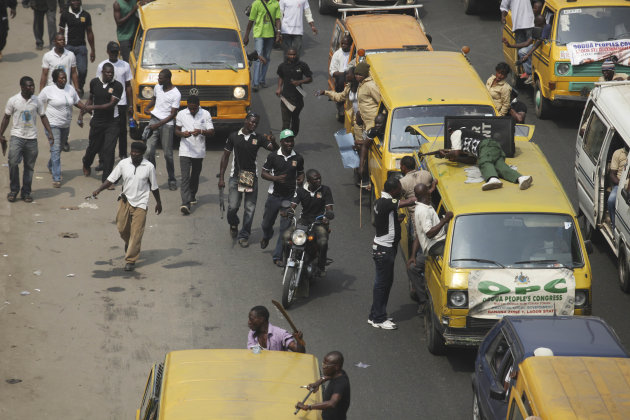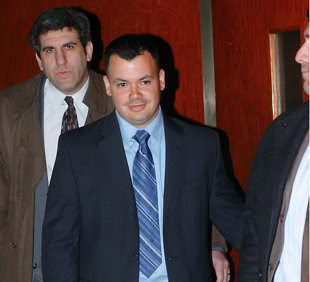
Unidentified members of Oodua People's Congress militia ride on buses carrying guns and machetes during a protest against Boko Haram in Lagos, Nigeria,Thursday, Dec. 8, 2011. The militia group from Nigeria's southwest walked through the streets of the commercial capital firing rifles as police and security forces fled. The group said they were protesting the rise of Boko Haram, a violent Muslim sect in the country's northeast which they claim are responsible for bombings and assassinations
LAGOS, Nigeria (AP) — The armed militia marched unstopped through Nigeria's largest city, firing shotguns and rifles in the air in what they called a protest against a radical Muslim sect responsible for killings across the oil-rich country.
The demonstration Thursday by members of the Oodua People's Congress highlighted the growing sense of insecurity and widening distrust among Nigeria's more than 160 million people and its major ethnic groups. Men armed with shotguns, rifles and machetes freely roamed the streets of Lagos without a sign of police, while passers-by shouted that their region of Nigeria should be protected — rather than the country as a whole.
"We don't want them to fight here in our Lagos because Lagos is for everybody, not for Yoruba alone, but for everybody," said Chief Orebiyi Ebenezer, a militia leader. "We need peace here in Lagos."
The Oodua People's Congress is a militia made up of Nigeria's Yoruba ethnic group, which dominates the country's southwest. The party takes its name from Oduduwa, the ancestor of the Yoruba race, and formed after military ruler Ibrahim Babangida annulled a presidential election in 1993 that many believe a wealthy Yoruba businessman won.
The group evolved into a quasi-political organization and likely receives the implicit support of major politicians in the region, though its members have been implicated in political violence and thuggery. Rumors abound in Nigeria's southwest that the group maintains a stockpile of firearms in a country where those weapons are strictly regulated by law, if not practice.
Those rumors appeared true as about 100 armed members riding in minibuses and marching by foot came into Lagos on Thursday, home to 15 million people. They fired long rifles and locally made shotguns into the air, unstopped by police as they ended up at Teslim Balogun Stadium, which hosted FIFA's Under-17 World Cup in 2009.
Leke Akintayo, a militia leader, said their protest was a show of force against Boko Haram, a Muslim sect in Nigeria's northeast that has killed at least 388 people this year alone, according to an Associated Press count. The group also claimed responsibility for the Aug. 26 bombing of the United Nations headquarters in Nigeria's capital Abuja as part of its campaign for the implementation of strict Shariah law across the nation.
"We OPC, we still exist," Akintayo said. "They should not fall (under) our hand. ... This is our father's land."
He added: "We are going to retaliate if there is any bomb blast hitting any place. We are ready for them. Anytime, any moment."
How the group would retaliate remains unclear, but Lagos remains a melting pot city for Nigeria's more than 250 ethnic groups. At risk would be those belonging to the Hausa Fulani ethnic group, Muslims who dominate the country's north.
Such ethnic-based violence remains all too common in Nigeria. Since the nation became a democracy in 1999, tens of thousands have died in communal violence that cuts across religious and ethnic lines, but often takes root in political or economic issues.
Different groups in Nigeria's south have claimed they would fight Boko Haram if the government fails to stop the group, including militants in the country's oil-rich and restive Niger Delta. However, Thursday's march represented the first time a militia took the street armed to display and threaten using force to end the violence.
That threat mixed with theater at one point as one man holding a pump-action shotgun walked by journalists and said in Yoruba: "Should we shoot it for you?" He racked a shell into the shotgun and fired as he walked down the busy street filled with uniformed school children trying to get home.




